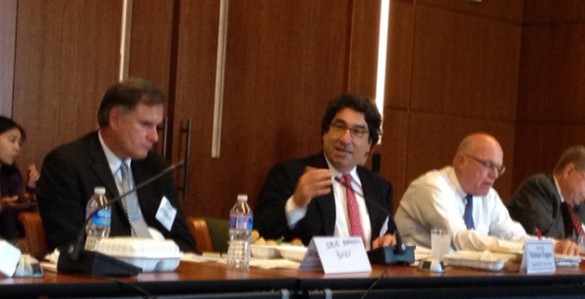
Chancellor Nicholas S. Zeppos traveled to Washington, D.C., to participate in “Research Universities and the Future of America: A National Convocation on Breakthrough Actions,” a one-day conference held Oct. 10 hosted by the National Academies of Sciences.
The event served as a follow-up to nine regional workshops held throughout the past year across the country—including a gathering at Vanderbilt—to discuss the 2012 National Research Council report “Research Universities and the Future of America: Ten Breakthrough Actions Vital to Our Nation’s Prosperity and Security.” The report was requested by a bipartisan group in Congress in 2009 that included Sen. Lamar Alexander (R-TN) and was viewed as a follow-up to the influential 2007 report “Rising Above the Gathering Storm.” That report led to the passage of the bipartisan America COMPETES Act in 2007 that authorized substantial increases in research funding for the National Science Foundation, the Department of Energy’s Office of Science and National Institute of Standards and Technology, and established the Department of Energy’s Advanced Research Projects Agency-Energy. The legislation was reauthorized in 2010.
The Oct. 10 gathering provided an opportunity for university leaders, including Chancellor Zeppos, and his peers in industry and government to engage in strategic discussion on implementation of the “Research Universities” report’s 10 recommendations. Formal remarks were given by Ralph J. Cicerone, president of the National Academy of Sciences; Dan Mote, president of the National Academy of Engineering; Harvey V. Fineberg, president of the Institute of Medicine; Rep. Rush Holt (D-NJ); Norman Augustine, former chairman and CEO of Lockheed Martin Corporation; and Hunter Rawlings, president of the Association of American Universities. The program also included three breakout working group sessions focused on revitalizing partnerships, strengthening institutions and building talent.
Zeppos was a key discussant in the working group focused on strengthening partnerships among universities, federal and state governments, philanthropy and the business community. During this discussion, he highlighted the importance of developing strong local and state-level partnerships and the need for universities to do a better job of educating its partners and the broader public on the positive economic impact that research institutions have in their home communities. Zeppos referenced data made available in Vanderbilt’s Vital Stats report, which stated that the university has an estimated impact of $8.6 billion in the state of Tennessee. Such data, according to Zeppos, provides elected officials with a clearer understanding of the benefits that institutions of higher education provide to the local economy.
Zeppos also emphasized how engaging local leaders in the commercialization process can lead to greater success in the tech-transfer domain. He specifically applauded Vanderbilt’s work in drug discovery and noted the benefits in relationship building that can be realized when universities recruit research talent not only from within academia, but from industry as well.
Following the conclusion of the working groups, the event closed with a call to arms by Chad Holliday, former chairman and CEO of DuPont, who asked all participants to take one action between now and Thanksgiving in support of the recommendations put forward in the report.
Contact: Marjorie Glick
margie.glick@vanderbilt.edu